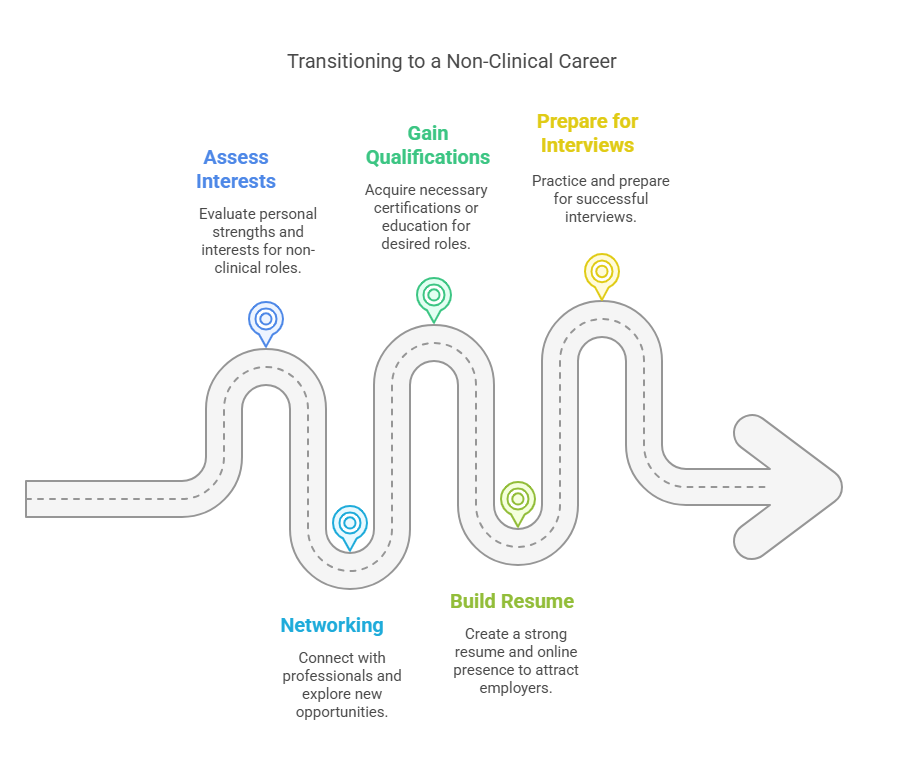Exploring Non-Clinical Opportunities for Physicians
Medicine has been renowned for the contribution towards patient care and medical achievements over the years. However, the normal path of a physician is a long hectic and stressful one with a lot of personal sacrifice. Although, in the recent past, more and more doctors have been finding different career opportunities that would use their medical skills but at the same time would provide a different lifestyle. Non-clinical positions are a great way to get out of direct patient care and stay in the medical profession if you are planning to change your career. In this blog, we will discuss different careers for physicians, the positives and negatives of these positions, and how to navigate the change effectively.
Types of Non-Clinical Opportunities
Healthcare Administration
Healthcare administration is one of the most sought-after professions for physicians who have no interest in practicing clinical medicine. Responsibilities include supervising healthcare facilities, monitoring budgets, and developing methods of delivering quality patient care. Key roles include:
Hospital Administrator
Medical Director
Chief Medical Officer
Pharmaceutical and Biotechnology Industries
The pharmaceutical and biotechnology industries offer various roles for physicians, including:
Medical Science Liaison
Clinical Research Scientist
Regulatory Affairs Specialist
Medical Writing and Communications
Those physicians with strong writing skills may very well find a rewarding career in medical writing and communications. These roles include:
Medical Writer
Medical Editor
Healthcare Communications Specialist
Consulting
Consulting offers physicians a way to exercise their expertise within healthcare organizations, insurance companies, and other institutions. Roles in this field include:
Healthcare Consultant
Management Consultant
Medical Advisor
Education and Training
Physicians can also transition into roles focused on education and training, such as:
Medical School Faculty
Continuing Medical Education (CME) Provider
Medical Training Program Director
Benefits and Challenges of Non-Clinical Careers
Benefits
Improved Work-Life Balance: Nonclinical roles are also steady in hours and come with more flexibility, thus offering a better work life balance.
Diverse Career Opportunities: The fact of the matter is that there are many kinds of non-clinical roles, which means that there is a position for everyone, regardless of their interests or skills.
Continued Use of Medical Expertise: Despite the fact that many non-clinical positions are available, a strong medical background is still a requirement for most of them, which enables doctors to utilize their knowledge in other ways.
Challenges
Transitioning Skills: The challenge of moving from a clinical to a non-clinical role is that new skills and knowledge are usually required. Moving from a clinical to a non-clinical role can be challenging as well as a change of career path.
Financial Considerations: Some non-clinical positions may be paid less than their clinical counterparts but this is a relative thing.
Identity and Satisfaction: Some physicians may face a problem of the change in identity and job satisfaction when leaving direct patient care.
Making the Transition to a Non-Clinical Career
Assessing Your Interests and Skills
It is important to assess your interests and skills before making a transition. Think about what you like to do in your clinical work and whether it is possible to transfer to a non-clinical position. Consider your strengths and where you may have some gaps in training or education, and why that is.
Networking and Research
This is very important when changing to a nonclinical career. Connect with your colleagues who also shifted to other positions, attend industry meetings and become a member of professional associations. The next step is to find out more about the types of roles that exist and the kinds of organisations that offer them.
Gaining Additional Qualifications
Some non-clinical roles may involve additional qualifications or certifications. For example, a physician trying to transition to healthcare administration might benefit from getting an MBA or MHA, in addition to their MD.
Building a Strong Resume and Online Presence
A strong resume and online presence are essential when applying for non-clinical roles. Highlight your medical expertise, relevant skills, and any additional qualifications. Consider creating a LinkedIn profile to connect with industry professionals and showcase your experience.
Preparing for Interviews
Prepare for interviews by practicing responses to common questions and researching the company or organization. Be ready to discuss how your medical background and skills make you a good fit for the role. Emphasize your ability to adapt and learn new things quickly.
Key Considerations for Physicians Exploring Non-Clinical Careers
Financial Implications
Transitioning to a non-clinical career can have financial implications. While some non-clinical roles offer competitive salaries, others may pay less than clinical practice. It's important to evaluate your financial situation and consider how a change in salary might impact your lifestyle.
Emotional and Psychological Impact
Leaving clinical practice can be emotionally challenging. Physicians often identify strongly with their role in patient care, and transitioning to a non-clinical career can feel like a loss of identity. It's important to address these feelings and seek support from peers, mentors, or a professional counselor if needed.
Continuous Learning and Adaptation
Non-clinical roles may require continuous learning and adaptation. Physicians should be prepared to acquire new skills, stay updated on industry trends, and be open to new experiences. This commitment to ongoing professional development can enhance job satisfaction and career success.
Tips for a Smooth Transition
Seek Mentorship: Find a mentor who has successfully transitioned to a non-clinical role. Their guidance and insights can be invaluable.
Stay Connected: Maintain connections with your medical peers and professional networks. This can provide support and potential job leads.
Focus on Transferable Skills: Highlight transferable skills such as leadership, problem-solving, and communication in your job applications.
Be Patient: The transition to a non-clinical career may take time. Be patient and persistent in your job search and professional development efforts.
Conclusion
Exploring non-clinical opportunities can be a rewarding career path for physicians seeking to leverage their medical expertise in new ways while achieving a better work-life balance. With careful planning, networking, and a willingness to learn, physicians can successfully transition to non-clinical roles that offer both personal and professional fulfillment. By considering the benefits and challenges, assessing their interests and skills, and seeking mentorship, physicians can navigate this transition smoothly and find new ways to contribute to the healthcare industry.
References
American College of Healthcare Executives. (2023). Healthcare Administration Careers. Retrieved from ACHE
Pharmaceutical Research and Manufacturers of America. (2023). Careers in the Pharmaceutical Industry. Retrieved from PhRMA
American Medical Writers Association. (2023). Medical Writing as a Career. Retrieved from AMWA
Society of Healthcare Consultants. (2023). Consulting Careers for Physicians. Retrieved from SHC
American Association for Physician Leadership. (2023). Physician Leadership and Education. Retrieved from AAPL
Institute for Continuing Medical Education. (2023). Opportunities in CME. Retrieved from ICME
By following these guidelines and considering the various aspects of non-clinical careers, physicians can make informed decisions and find fulfilling roles that align with their professional goals and personal aspirations.
Explore Courses for Clinical Research Career
Courses Available:




